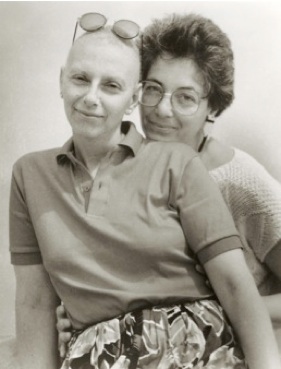Cancer in Two Voices

Lucy’s sister Spivey died of breast cancer in 1989. The following year she was asked to look at videotaped home movies of Barbara Rosenblum, who learned that she had advanced breast cancer in 1985, and with her partner Sandy Butler, asked their friend Ann Hershey to document the time that remained for them as a couple. In these home videotapes that showed the strong relationship between these two highly articulate and self-aware women, Lucy saw a journey that would be meaningful to others. As Barbara wrote in her journal, “I’m the first among our friends to have cancer... Many will see their future in the way I handle mine.”
In Cancer in Two Voices we see Barbara at home, sharing the poems and music she loved, showing her garden, and talking about what she was learning of her life in the shadow of her death. The words from both Barbara and Sandy, the videotaped interviews and a collection of still photographs are the materials from which this film was created. *
Linda Dubler from Atlanta’s High Museum writes: “It is an exceedingly modest production. The form of the film is confined by the intent and the limits of the original tapes,” explains Phenix. Her lucid, uncluttered approach makes a virtue of simplicity. Lucy never loses sight of her film’s greatest strength: the articulate and deeply committed women at its center, who reveal themselves fearlessly. Cancer in Two Voices is completely devoid of experts. The factual material it contains about breast cancer appears as non-narrated text; there are no interviews with the doctors who cared for Barbara, the therapists, or public health officials with views on the explosion of breast cancer in the U.S. A misdiagnosis and subsequent malpractice suit are cited only briefly. What matters to Phenix is the emotional transformation that Barbara and Sandy describe and embody: the texture of their lives together, the co-existence of love and resentment, laughter and tears, memory and living in the moment, the urge to protect and to let go. Piecing together their home movies and photographs, she adopts a nearly invisible editing style that gives the work a quiet, fluid rhythm. Her respect for her subjects makes even the most painful and potentially embarrassing moments seem approachable. This is Phenix’s signature--a sensibility that dignifies the smallest daily trials, and which delicately and with great subtlety, reveals those who struggle as heroes.”

Audience Award Winner: Best Foreign Documentary
Films de Femmes,
Creteil, France
Berlin Film Festival
Sundance Film Festival
London Jewish Film Festival
New York, San Francisco,
Los Angeles Lesbian and
Gay Film Festivals
Contact: